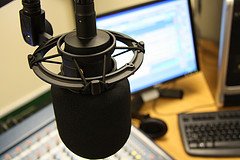Is This Thing On? 6 Tips For Doing Author Interviews
This week I was interviewed by the editors at The Fem, an online feminist literary magazine.
It's always a thrill to be interviewed--not just because it's flattering, but because it forces us to step back and behold our work, our lives, and why we even bother to write in the first place.
The best author interviews sound chatty and authentic, while also delivering insights into the author's life and work--and the writing process in general.
Whether you're being interviewed online, on air or on stage, never, ever speak off the cuff. I borrow from my day job here. As a communications director for a non-profit, I have learned to never get on the telephone or participate in any high-impact meeting or conversation without setting goals, preparing message points and drafting what I plan to say.
Of course, you never want to sound like the scripted politician speaking strictly on message, but preparing ahead will help you to deliver information that's of real value to your readers and to your sister writers.
Here are 6 tips for doing author interviews:
1. Request the questions ahead: Once you get the questions, it's not enough to make a mental plan of what your responses will be. Write out each response, then refine and rehearse them until you're satisfied. Discard that script so that, on the day, you will sound natural. When it comes to major media outlets, most journalists will not provide the questions ahead. In this case, ask for the main topic area(s) that you will be expected to discuss.
2. Dress for success: If the author interview is on T.V. or on stage (say, at a writer's symposium or conference), dress professionally. Wear a plain but flattering color, with simple designs and clean lines (no frills or flounces) and without any polka dots or busy patterns.
3. Create your own talking points: Ask two writers the exact same question and they will each answer it differently. Before you dive in and begin to review or script your answers to the interviewer's questions, create a list of your own talking points. What do you want to get across here? What would you like to happen as a result of this interview? Once you have your talking points, read over the interviewer’s questions and weave your talking points into your responses--but only if they're a natural fit. Remember, this is an interview, not a self-marketing pitch.
4. Slow it down: This doesn't apply to online or print interviews, but if you're on screen or on stage, remember that your audience is not as immersed in your topic as you are. Therefore, there's an inevitable lag-time between what you say and how quickly or easily the audience assimilates what you've said. Slow it down, summarize key points, and don't be afraid of or rush to fill silent pauses.
5. Give them the goods: Even if s/he says s/he already has it, follow up to make sure the interviewer or producer has your bio, including your name and, if your name has an unusual spelling, include how to pronounce your name. For online interviews, provide the bio, a professional head shot photo and a link to your author website. If this is a return appearance, review your bio to check if it needs to be updated.
6. Follow up with a thank-you: Be a good literary citizen. After the interview, send a hand-written or well-written email thanking the interviewer for the time and his or her thoughtful questions. It's also important to do your part in posting the interview via your social media networks and, in each posting, remember to credit the publication or interviewer.
Got your own tips to add? Write them in the comments.
Photo: Creative Commons license.
